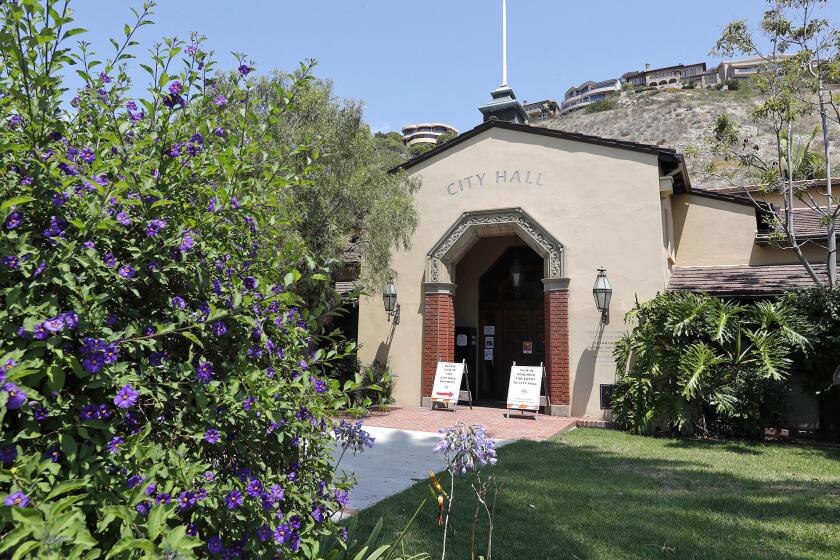Playhouse offers a bountiful ‘Picnic’
- Share via
Tom Titus
Flavor and atmosphere, two elements often absent in community theater
productions, are present in abundance in the splendid revival of
William Inge’s masterwork “Picnic” at the Huntington Beach Playhouse.
Set in a rural back yard in the early 1950s, realistically
designed by James Gruessing, this timeless romantic drama benefits
from attention to atmospheric detail as much as from the sterling
performances under the meticulous direction of Terri Miller Schmidt.
We hear crickets chirping after dark, neighborhood dogs barking
intermittently and the sound of approaching cars, and their
headlights, individually differentiated depending on whose vehicle is
arriving.
About the only thing we don’t hear are the familiar strains of
“Moonglow,” the theme from the movie version of Inge’s play, which
also may be a statement of sorts -- We’re having our own “Picnic”
here, not William Holden’s or Kim Novak’s. Don’t look for any torn
shirts here, either.
Few plays capture the spirit, and the attitudes, of small-town
America quite as fully as “Picnic.” At Huntington Beach the restless,
nervously captive feelings clash significantly with those of the more
conventional characters so reluctant to rock their particular boats.
The central love story between the macho drifter, Hal Carter, and
the town beauty, Madge Owens, is fervently played out by David Farkas
and Heather Smith. The muscular Farkas inhabits the character of the
former football hero Hal with physical authority, tempered by his
uneasiness in social situations. He may not respect himself for
moving in on his best friend’s girl, but the fervor that motivates
him is overpowering, and Farkas plays this episode believably.
Smith requires more time to warm to her deceptively complex
character of a young woman reluctant to trade solely on her physical
charms, but once the impromptu romance is set in motion, she delivers
a strong and vibrant performance. The sparks between these two lovers
are firmly ignited and Smith’s final scene is riveting.
Jessica Jewett as Millie, Madge’s younger and brainier sister,
eschews the total tomboy image dictated by the script for a more
fiery intellectual choice, which dilutes her eventual blossoming late
in the first act, but her passion is splendidly displayed. Marsha
Collins excels as the girls’ mother, desperately trying to prevent
her eldest daughter from experiencing her own heartbreak.
As Rosemary, the spinster schoolteacher not as content with her
station as she professes, Sherryl Wynne notches a tentative but
eventually touching performance, though her climactic sequence could
benefit from more raw desperation. Tony Grande as her folksy,
tippling beau fits comfortably into a character whose chronic
discomfort is memorable in his closing scene.
Chad Bartulis as Alan, Madge’s wealthy boyfriend and Hal’s old
college chum overemphasizes the blandness of his character,
particularly when watching Madge and Hal embrace with almost glassy
nonchalance. Michelle Calhoun-Fitts enlivens the role of the neighbor
lady chained to an (unseen) demanding mother.
Rosemary’s fellow schoolteachers are nicely interpreted by
Mary-Pat Gonzalez as the loquacious, more experienced Irma and Sheree
Cottrill as the effervescent newcomer Christine. James Reagan as the
brash newsboy, Bomber requires some seasoning but spices up his brief
appearances.
“Picnic” may be a certifiable antique, but the emotional
transitions so skillfully defined by Inge remain a constant of the
human condition. The Huntington Beach Playhouse’s splendidly detailed
revival is one of the season’s more significant contributions.
All the latest on Orange County from Orange County.
Get our free TimesOC newsletter.
You may occasionally receive promotional content from the Daily Pilot.









